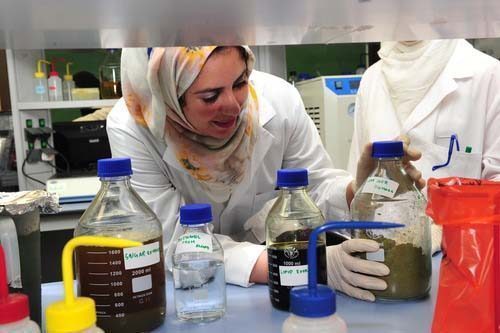
As world leaders convene in Doha for the UN Climate Change conference, COP18, which began today, Qatar University (QU) has revealed details of its research into an environmentally-friendly fuel designed for use in the aviation industry.
It’s the sort of good news Qatar needs as it comes under the inevitable global scrutiny that such a conference brings.
Working in collaboration with Qatar Airways and the Qatar Science and Technology Park (QSTP), QU researchers have developed a biofuel based on single-celled organisms (cyanobacteria and microalgae) that are unique to Qatar.
These organisms grow well in Qatar’s extreme heat, strong sunlight and highly saline waters. When fully grown, fat is extracted from them to make the fuel, which is being specifically designed for aircraft.
Qatar produces nearly 50 tons of carbon dioxide a year for each of its 1.8 million residents, leading environmental campaign group WWF to name Qatar as the country with the largest ecological footprint in the world.
This is why this new fuel – which recycles Co2 rather than pumps it back into the atmosphere – is of such interest to the government.
So far, the research team has been growing the organisms in 1,500-liter outdoor tanks at QU’s research farm in Al Khor. Having grown them successfully for six weeks, they will now carry out a trial in 25,000 liter, specially-designed outdoor research ponds.
Biofuels Project Director Dr. Malcolm Potts explains:
“There is a real push for fuel derived from organisms living on the planet – biofuels. The problem is that in many countries arable land is used for growing them. What we are doing here is working with photosynthetic micro-organisms which can be grown anywhere, and which are particularly suitable to the environment of Qatar. We are trying to develop a biofuel industry here in Qatar, using new technologies not found anywhere else in the world.”
Qatar Airways has long been keen to utilize alternative fuel sources, which will help it reduce the airline’s carbon footprint and its costs simultaneously.
In 2010, it conducted the world’s first commercial passenger flight using a Gas-to-Liquid (GTL) fuel blend. GTL fuel is derived from natural gas, which although still a fossil fuel, is a “cleaner burn”, meaning that it will reduce the airline’s emissions significantly.
Qatar’s hosting of COP18 is not without its critics, but Abdullah Bin Hamad Al-Attiyah, Qatar’s deputy prime minister and the conference president, insists Qatar is committed to bringing about real environmental change:
“We hope the conference will produce tangible results and reinforce international cooperation”, he told Al Jazeera. “Qatar is also one of the 10 developing countries predicted to be most affected by rising sea levels. Environmental sustainability is a key pillar of our national vision.”
However, Jamie Henn, co-founder of the environment campaign group 350.org, sees things differently:
“It is hard to avoid the irony of Qatar hosting the event,” he says. “This is a little bit like McDonald’s hosting a conference on obesity. If anything, it shines a bit more spotlight on Qatar and on the steps that can be taken to address the problem.”
Thoughts?
Credit: Photo courtesy of Qatar University







